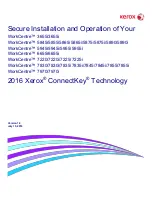
12
13. If Embedded Fax is enabled and then subsequently disabled before there is a power failure or system crash
and Embedded Fax is then re-enabled after the device is restored to operational mode, the first ODIO that is
subsequently initiated may fail. If that situation occurs, reinitiate the ODIO.
Note: When an ODIO fails under this scenario no Fax ODIO report may be printed, the WebUI may indicate
that the ODIO was successful, the Confirmation Report may indicate that the ODIO was ‘Not Completed’
because the device lost power and the Audit Log may indicate that the
ODIO was ‘Cancelled’.
14. If there is a failure in the hard disk drive(s)
a message recommending that an On Demand Image Overwrite be
run will appear on the Control Panel screen. An Immediate Image Overwrite Error Sheet will also be printed or
may contain incomplete status information. Immediately perform the requested On Demand Image Overwrite.
15. The time shown on the On Demand Overwrite progress screen displayed on the Control Panel may not reflect
Daylight Savings Time. The message shown on the On Demand Overwrite progress screen displayed on the
Control Panel may be slightly different for different products, reflecting the expected time the ODIO will take to
complete for that product.
16. If an ODIO is successfully completed, the completion (finish) time shown on the printed On Demand Overwrite
Confirmation Report will be the time that the system shuts down.
17. Perform a Full ODIO immediately before the device is decommissioned, returned, sold or disposed of.
e. The device supports the use of SSLv2.0, SSLv3.0, RC4 and MD5. However, customers are advised to set the
crypto policy of their clients to request either TLSv1.x (SSLv3 should be disabled) and to disallow the use of RC4
and MD5. The cryptographic module supports additional ciphers that may be called by other unevaluated functions.
Using the device in FIPS mode will automatically restrict the device to using TLSv1.x only.
f.
When utilizing SSL for secure scanning:
SSL should be enabled and used for secure transmission of scan jobs.
When storing scanned images to a remote repository using an https: connection, a Trusted Certificate Authority
certificate should be uploaded to the device so the device can verify the certificate provided by the remote
repository.
When an SSL certificate for a remote SSL repository fails its validation checks, the associated scan job will be
deleted and not transferred to the remote SSL repository. In this case the job status reported in the Completed
Job Log for this job will read: “Job could not be sent as a connection to the server could not be established”.
The HTTPS protocol should be used to send scan jobs to a remote IT product.
g. Audit Log Notes:
Some text in the Audit Log may contain strings that are not written in US-ASCII.
In viewing the Audit Log the System Administrator should note the following:
User names in Audit Log entries can sometimes include extraneous characters.
Deletion of a file from Reprint Saved Job folders or deletion of a Reprint Saved Job folder itself is recorded
in the Audit Log.
Deletion of a print or scan job or deletion of a scan-to-mailbox job from its scan-to-mailbox folder may not
be recorded in the Audit Log.
Deletion of a held job may display an incorrect status in the corresponding entry in the Audit Log.
Extraneous process termination events (Event 50) may be recorded in the Audit Log when the device is
rebooted or upon a Power Down / Power Up. Extraneous security certificate completion status
(Created/Uploaded/Downloaded) events (Event 38) may also be recorded.
Extraneous events may be recorded in the Audit Log when McAfee
®
Embedded Control is enabled or
disabled, when FIPS 140-2 mode is enabled or when a user permission role is defined.
Duplicate audit log entries may appear in the Audit Log for some events such as when the system timeout
values are changed or when adding/deleting a Domain Controller for smart card authentication.
Download and review the Audit Log on a daily basis. In downloading the Audit Log, the System
Administrator should ensure that Audit Log records are protected after they have been exported to an
external trusted IT product and that the exported records are only accessible by authorized individuals.
If a system interruption such as power loss occurs, a job in process may not be fully written to the hard disk
drive(s). In that case, any temporary data created will be overwritten during job recovery but a corresponding
record for the job may not be recorded in the completed job log or audit log.



















